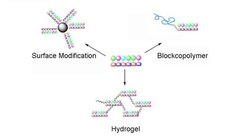Research
Carbohydrates are not merely a source of our nutrition. Many sugars are bioactive in that their structure contains molecular information that is recognized by cell receptors to control various important biological functions, such as cell signaling and immune response. Therefore, the synthesis of complex sugars containing the “right” information and understanding their biomolecular interactions is crucial to the advances in biomedicine and related areas.
A video produced by Beilstein TV presents our labs and our current scientic goals. Link to video
The main focus of the Emmy Noether junior research group 'Polymeric Biomimetics' is the synthesis of sequence-defined neoglycopolymers and their use for biomedical applications. Neoglycopolymers are polysaccharide-mimetics, usually consisting of a polymeric backbone or framework carrying saccharid groups in the side chain. In comparison to the natural polysaccharides such artificial mimetics are easier to synthesize but still keeping or even exceeding the biological activity.
Nevertheless they are polydisperse due to the limited control during polymer synthesis. Polydispersity often results in uncontrolled/unwanted biological activity and thus minimizes the use of conventional neoglycopolymers for biomedical applications. Here, we now introduce higher precision and thereby functionality to the class of neoglycopolymers by using solid phase synthesis and specifically designed building blocks to access monodispers, sequence-defined neoglycopolymers.

These neoglycopolymer-segments can then be used as building blocks for a platform of different structures such as blockcopolymers, hydrogels or surface modifications addressing different applications such as drug delivery or new drug development. This new material class also allows deciphering the complex molecular interactions of polysaccharides with biologic systems.


